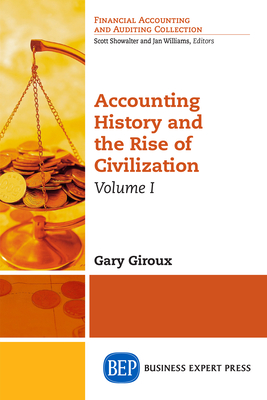Accounting History and the Rise of Civilization, Volume I

Accounting History and the Rise of Civilization, Volume I
Volume 1 of Accounting History covers the first 10,000 plus years of the rise of accounting and civilization. Conveniently, accounting was part of the developing culture from the start. With fortified villages, accumulating wealth meant inventory accounting, first using tokens (clay balls) and eventually writing plus the abstract concepts of numbers. Cultures evolved in Mesopotamia and elsewhere. After the Crusades, Italian city-states created merchant wealth based on the creation of double-entry. Luca Pacioli's Summa described the Venetian system, which traveled north thanks to Gutenberg's printing press. Enhanced forms of manufacturing, banking, and merchant trade continued. England proved to be a special place, where the Industrial Revolution was born. Along the way, accounting sophistication rose as entrepreneurs discovered the need for complex information to survive. Accounting became a profession as business became big and important enough to employ professionals. The United States went from an agrarian backwater to an industrial power in 100 years. Accounting sophistication matched business complexity, as manufacturing accounting and control techniques developed capable of providing information needed to run giant firms. Railroads became big, requiring complex accounting system. Andrew Carnegie used his railroad experience to adapt the railroad accounting systems to steel manufacturing. Industries consolidated and the need for effective accounting control became imperative. Du Pont proved to be the most effective innovator and this knowledge expanded at General Motors, systems that dominated beyond the mid-20th century. Accounting History is written for accounting and business students plus business professionals. It's not written for accounting historians, although they may find this book useful. The writing is basic without much jargon, so the general public will also find this book insightful.
PRP: 136.34 Lei
Acesta este Prețul Recomandat de Producător. Prețul de vânzare al produsului este afișat mai jos.
122.71Lei
122.71Lei
136.34 LeiLivrare in 2-4 saptamani
Descrierea produsului
Volume 1 of Accounting History covers the first 10,000 plus years of the rise of accounting and civilization. Conveniently, accounting was part of the developing culture from the start. With fortified villages, accumulating wealth meant inventory accounting, first using tokens (clay balls) and eventually writing plus the abstract concepts of numbers. Cultures evolved in Mesopotamia and elsewhere. After the Crusades, Italian city-states created merchant wealth based on the creation of double-entry. Luca Pacioli's Summa described the Venetian system, which traveled north thanks to Gutenberg's printing press. Enhanced forms of manufacturing, banking, and merchant trade continued. England proved to be a special place, where the Industrial Revolution was born. Along the way, accounting sophistication rose as entrepreneurs discovered the need for complex information to survive. Accounting became a profession as business became big and important enough to employ professionals. The United States went from an agrarian backwater to an industrial power in 100 years. Accounting sophistication matched business complexity, as manufacturing accounting and control techniques developed capable of providing information needed to run giant firms. Railroads became big, requiring complex accounting system. Andrew Carnegie used his railroad experience to adapt the railroad accounting systems to steel manufacturing. Industries consolidated and the need for effective accounting control became imperative. Du Pont proved to be the most effective innovator and this knowledge expanded at General Motors, systems that dominated beyond the mid-20th century. Accounting History is written for accounting and business students plus business professionals. It's not written for accounting historians, although they may find this book useful. The writing is basic without much jargon, so the general public will also find this book insightful.
Detaliile produsului













